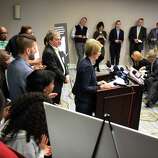State budget talks inch along
Still hoping for conclusion by Good Friday
Published 5:54 pm, Tuesday, March 27, 2018
ALBANY — Lawmakers and Gov. Andrew Cuomo on Tuesday inched toward completion of the 2019 state budget amid both complaints about proposed fees and taxes and optimism that a deal was coming together.
“All we’re doing is supplanting money,” GOP Sen. Fred Akshar said, explaining his opposition to a tax on legally prescribed opioids that Cuomo wants.
The Broome County lawmaker's remarks came after he stood with the conservative Reclaim NY group and reiterated the Republican Senate’s position that they wouldn’t approve any of the more than $1 billion in new taxes and fees that Cuomo and Assembly Democrats want.
“New York doesn’t have a revenue problem, we have a spending problem," said Akshar.
Armed with the knowledge that they still had two full days and nights to complete the budget by Friday, which is March 30, lawmakers and the governor appeared to be moving slowly but steadily toward a deal.
The governor and three legislative leaders: Senate GOP Majority Leader John Flanagan, Senate Independent Democratic Conference Leader Jeff Klein and Democratic Assembly Speaker Carl Heastie met for more than an hour Tuesday in the governor’s second-floor office.
Following the meeting, Flanagan said he was “cautiously optimistic” but had to go back and meet with his conference.
Flanagan also confirmed that they may look at a commission to study a potential legislative pay hike. Lawmakers haven’t had a raise in their $79,500 base pay since 1990, but there have been concerns that giving themselves a raise could become a liability around election time.
Klein said he was hoping the printing of budget bills could start Tuesday night. He said they were hoping to agree on a shortfall fund to cover potential federal health care cuts.
Heastie didn’t sound so optimistic, saying simply that he had to confer with members of his conference.
Earlier in the day, lobbyists loitering outside the Senate and Assembly chambers quizzed each other and reporters about what they’d heard but there was none of the frenzied activity or behavior that normally comes as a deal grows close.
Reclaim NY provided a list of taxes and fees it opposes, including an internet sales tax expansion, increased New York City property tax for public transit, a $1 ride-sharing tax for upstate Uber or Lyft users and a $200 million right-of-way fee for internet providers looking to expand their broadband service area.
Additionally, Cuomo and leaders were considering a rule that would collect reserve funds above 150 percent of the mandatory minimum for non-profit Medicaid managed care plans.
That would hit Fidelis, which is affiliated with the Catholic church, and MetroPlus, which is operated by New York City Health and Hospitals system.
Insurers are required to keep some level of reserves to cover unexpected expenses.
Rachel Silberstein contributed
